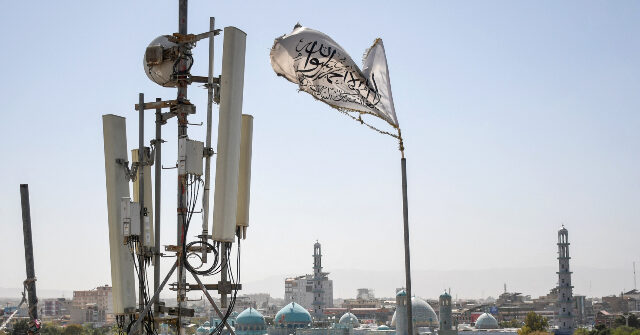A massive Internet blackout struck Afghanistan on September 29, evidently imposed by the Taliban regime to “prevent immoral activities,” as a spokesman for the Islamist junta put it.
Radio Free Europe (RFE) noted that Taliban officials were spotted “severing fiber-optic cables in multiple provinces” a few weeks ago, causing local Internet outages.
On Friday, a regime spokesman in the northern province of Balkh said the cables in his region were cut on the orders of Taliban Supreme Leader Haibatullah Akhundzada. Three days later, the Internet went dark in most of Afghanistan and mobile phone service was sharply degraded.
“Recent studies in Afghanistan found that internet applications have badly affected the ongoing, economic, cultural and religious foundations of society,” the Taliban spokesman said.
Netblocks, an Internet watchdog group, reported on Monday that Afghanistan “is now in the midst of a total internet blackout as Taliban authorities move to implement morality measures.” Netblocks said the blackout was still in full effect as of Tuesday afternoon.
Post by @netblocks@mastodon.social
View on Mastodon
“We are blind without phones and internet. All our business relies on mobiles. The deliveries are with mobiles. It’s like a holiday, everyone is at home. The market is totally frozen,” a Kabul shopkeeper told The National as the blackout continued on Tuesday.
A bank employee in Kabul told AFP that his clients were left without “access to online banking, transactions, cash withdrawal, or money authorization.”
An Afghan government source told AFP that the shutdown would last “until further notice,” and would affect “the banking sector, customs, everything across the country.” AFP was unable to reach its own bureau in Kabul by telephone on Monday evening.
Several other local and international news organizations said their operations were affected by the Internet shutdown, including RFE and Afghanistan’s Tolo News.
The National reported that Akhundzada began talking about shutting down the Internet and mobile phone networks this month. His advisers warned that Afghanistan’s already fragile economy would suffer catastrophic damage from an Internet blackout, but the Supreme Leader apparently chose to disregard those warnings.
The United Nations on Tuesday called on the Taliban to immediately restore Internet and telecom services.
“The cut in access has left Afghanistan almost completely cut off from the outside world, and risks inflicting significant harm on the Afghan people, including by threatening economic stability and exacerbating one of the world’s worst humanitarian crises,” the U.N. Assistance Mission in Afghanistan (UNAMA) said.
“The current blackout also constitutes a further restriction on access to information and freedom of expression in Afghanistan,” UNAMA added.
The U.N. said its own operations in Afghanistan were “severely impacted” by the blackout, forcing its personnel to rely on “radio communications and limited satellite links.”
The BBC reported on Tuesday that the airport in Kabul was “at a standstill” and “nearly deserted,” with “no evidence of planes arriving or leaving.” Airport officials said all flights were canceled on Monday night, and would not resume until Thursday at the earliest.
“The Taliban should drop its excuses about morality and instead focus on how these shutdowns are causing irreversible harm,” Human Rights Watch (HRW) researcher Fereshta Abbasi told the UK Guardian on Tuesday.
Read the full article here


